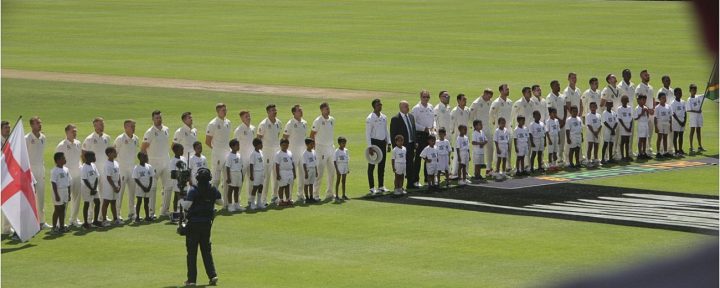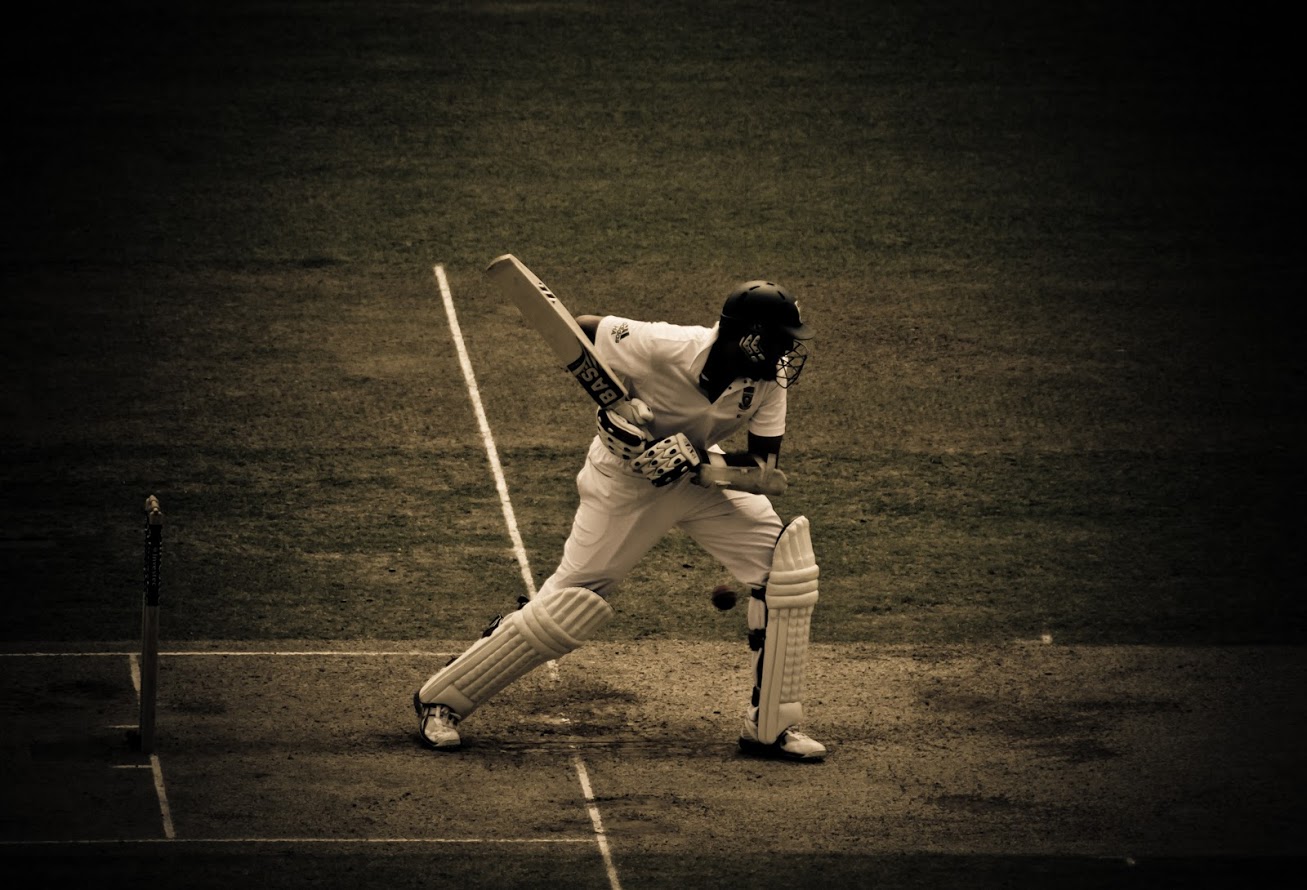Already, the plane crash feels like it was a long time ago. Yet at the start of the year English cricket was a mess, a twisted mangled wreckage and, while the blackbox was never found, you assume it recorded little more than management speak and an insistence on ‘taking the positives’.
Today, it can be hard to even remember the men that went down in that crash. We’ve arrived somewhere new, a place where the sixes are long, the slip cordons enormous and the managing director comprehensible. Yet Ashley Giles, Tom Harrison and Chris Silverwood represented a curiously English phenomenon – and one that risks returning unless recognised.
Check the eulogies of Silverwood and Giles and each is recognised as a ‘good bloke’. Criticism is light, despite the Test team’s appalling performance last year and the raft of bad ideas, particularly those spouted by Giles, that led to the mess.
Harrison burnt his reputation with some fans by launching The Hundred and with all fans by gouging out a bonus from the ECB’s then-skint coffers. However, he was seen as something similar to all the others at the time of his appointment: a safe pair of hands, a reliable bloke, a known entity.
All three were from a long line of familiarity and complacency. Indeed, the history of English cricket can be seen as one long battle between the good blokes and the outsiders, between (often vested-interest) conservatism and an ability and desire to think.
The good blokes are amiable, affable chaps. In lieu of speaking intelligently, they opt for the bland and the cliched. Instead of conflict, they seek resolution. They like their conservatism with a small ‘c’ and their Duke’s ball with a large seam.
Once they were the Gentlemen, but today their type is less clear, though they seem to always be white and are always in agreement with each other. Good blokes are good at getting onto, appeasing and managing committees. Good blokes agree with good blokes, good blokes hire good blokes, good blokes like good blokes.
Unsurprisingly then, the main problem with good blokes is groupthink. At its most benign, this leads to the Ashes fiasco in which over-planning caused muddled selection, stupid tactics and another drubbing. It can lead to long, slow failures or quick, sudden ones. Either way, good blokes tend to lead badly.
English cricket is saved by outsiders. Its best teams have been led by Duncan Fletcher and Andy Flower, outsiders not afraid to tell the good blokes where to go and only appointed after disasters that fully exposed the previous good bloke regimes. At each point their work ruined as the higher up good blokes appointed the same good bloke, Peter Moores, to replace them.
Perhaps the best example of the outsider is Eoin Morgan. Nowadays it seems inconceivable that Alastair Cook was kept as ODI captain for so long. While world cricket moved forwards, England’s ODI cricket stayed stuck and stodgy.
But remember, then-Chairman Giles Clarke said that Cook ‘and his family are very much the sort of people we want the England captain and his family to be’. Cook was a good bloke. Sacking him was too disruptive and only happened, as change always happens, after an utter catastrophe. Morgan thankfully burnt Cook’s ODI legacy and, in doing so, shaped a team full of outsiders and diverse talent.
England’s current potential saviours, Brendon McCullum, Ben Stokes and Rob Key, are similarly outside of the good bloke mold. They think differently and speak clearly. Like the others, their appointment was only made possible by the team’s complete breakdown. Hopefully, like the other outsiders, they lead English cricket to new highs.
The risk, though, is that they will one day be replaced by the good blokes. English cricket tires of outsiders. Yet it can no longer afford to. The events of the past two years show what happens when a good bloke culture is dominant.
Middlesex’s chairman, Mike O’Farrell, who seems every ounce the good bloke, can tell a Parliamentary Committee lazy racial stereotypes because that’s what he’s heard from other good blokes. Jofra Archer can be roundly accused of ‘not trying’ by the good blokes, even as he bowls his elbow to dust. Good blokes can go on apartheid tours then fall comfortably into semi-retirement in Lord’s committee rooms.
These are just a few examples and aim not to suggest good blokes are themselves racist. Rather, they show how good bloke culture leads to bad outcomes.
Good blokes can oversee institutional prejudice because to do otherwise would disrupt the friendly good bloke atmosphere, and to know that such prejudice exists would require talking to people outside of the good bloke bubble. Good bloke culture is unknowingly exclusive, because it rests on shared assumptions and behaviours, and is reinforced by a shared reluctance towards being challenged.
Most importantly, the huge, disruptive change that is required to combat cricket’s racism problem will be hard to achieve within a world led by good blokes. Rather, good blokes are likely to stick to writing buzzword quotes for CSR reports and holding Moments of Unity.
Similarly, what can good blokes really do about cricket’s growing elitism? How can they really understand what’s required when their world is so familiar, secure and within cricket?
We need something bigger, and we need outsiders. The hope is that the situation is dire enough that it leads to this change.
English cricket can no longer afford to be run by good blokes, either on or off the field. Good blokes’ lazy thinking, tendency to speak in muddled terms rather than act, and desire for comfort are just too limiting to allow for real, significant change. Let’s hope this time they’re gone for good.
Sam Barnett







This is lazy thinking. It falls apart because Tom Harrison was never considered as a good bloke. Remotely. The “good bloke” who fits your description is still in power – namely Andrew Strauss who presided over the crash. Silverwood was appointed because the ECB wanted to put Test cricket out to grass. Morgan was appointed because 50 over cricket became a priority – such as winning the next World Cup. And you will find that, no, the new ODI side was not a team full of outsiders but the same players more or less with a new aggressive directive. Ironic then that the World Cup was played by two sides that had to bat more old school than new school. It was a low scoring thriller and top man Stokes actually had to get himself in and occupy the crease and accumulate runs before hitting out. How different from the mindset of new outsider Baz for example when he played in the previous Final – three strokes and he was out. It’s not good blokes versus outsiders. That’s a smokescreen. It’s the same old Money talking. Tom Harrison talked up The Hundred as a game for mums and kids. More like Lads on the Raz. The summer highlight is 8 teams while 18 Counties fall silent and 10 on the sidelines. And this was somehow supposed to extend cricket. Now the ECB wants to cut the Counties even more. 10 Championship games instead of 14. Is there actually a department for the Promotion of Cricket that isn’t just a slogan on a crisp packet? If you de-skill cricket you end up with a less interesting and attractive game. Football has avoided that path and is now more skilful than it has ever been. Spectators appear to delight in the complex formations and strategies employed by top coaches. The more complicated the better! Cricket used to be compared to chess. Now it’s football! Dumbed down entertainment for dumb fans is the kind of sales pitch that dumb money men come up with. Like Harrison.
Jackie
I quite agree. I wrote my post before I read your’s. Had it been the other way round, I probably wouldn’t have bothered to post !
In what way is Strauss still in power?
Good point but I don’t think the Good Blokes act maliciously. Outside voices, like Morgan and McCullum should be welcome, but respect should be shown to the Good Blokes who have dedicated their careers to cricket. They mightn’t always be right, but nobody is perfect.
All true, sadly.
The worst thing of all is that we call these people “good blokes”. It’s these good blokes that pressurise the victims of sexism, racism and homophobia to back down on their claims and not rock the boat. Everything that’s wrong in the world, let alone in cricket is down to these people. Good blokes my arse.
Exactly. The BBC as another example, is full of good blokes (what an awful term) and has become a complete woke organisation as a result.
Always makes me smile when people call the BBC ‘woke’. Those on the political left often see the BBC as a part of the establishment. Here in Scotland, nationalists see the BBC as part of a Unionist conspiracy, whilst in NI the DUP see the BBC as part of a nationalist conspiracy. They can’t all be right! Personally, I like the fact that the BBC upsets all sides of the political spectrum.
I think you are twisting history here a bit to suit your narrative. I don’t think anyone said that of Harrison at the time of his appointment – far from it, nor did I ever hear Graves, or indeed Giles Clarke described thus. Successful players, captains and coaches need to have a tough side too them, but that doesn’t mean they can not be personable and affable as individuals. Whilst the likes of Illingworth and Close were the antithesis of the people you are describing, there are plenty of examples of people who played hard, but were also adept at man management and remained personable as individuals. This includes captains – e.g. Dexter, Brearley, Greig, Vaughan – selectors – Geoff Miller – and players too numerous to mention. I think you are right that some of the appointments you mention had a ‘don’t rock the boat’ element to them (none more than Strauss) and that is reflected in who they in turn appoint. Giles’s appointment had failure written all over it and he, in turn, opted for Silverwood over Kirsten !!! What we need in all positions is the best available, taking everything into account. The problem has often been that even the best available hasn’t been good enough !
Firstly, I very much agree with the comments by Jackie and John.
“England’s current potential saviours, Brendon McCullum, Ben Stokes and Rob Key, are similarly outside of the good bloke mold. ”
Really? Key in particular seems the epitome of the good bloke, McCullum too to quite a large extent.
And spare us the ‘woke’ racial angle. Explain Ottis Gibson….
Amazing–you reduce an argument to a lazy, vacuous, one-word piece of insulting jargon and then find it doesn’t completely fit your one-dimensional definition. Astonishing, that….
The idea that good blokes, a very tenuous definition by the way, are the main issues behind the fragmentation of the game seems ludicrous to me and the idea that blokes from outside can come in and blow the complacent cobwebs away seems incredibly simplistic. The short term pursuit of the cash cow is clearly the problem sport everywhere is up against, look at golf, boxing and footie and outsiders are a major factor here, as businessmen with money to burn and their marketing cohorts invest in high return gimmicks without any real concern for the long term future of their sport. They are clearly not ‘good blokes’.
I agree with Sam’s thesis if not all the examples. We can all argue about what ‘good bloke’ means. I think that’s where people are taking umbrage. For me, ‘good bloke’ in this context means ‘company men’ or those unlikely to rock the boat. The ECB has been like that for years, with the rise and recycling of Ashley Giles the perfect example. The idea there have been too many ‘yes men’ in english cricket is spot on. And it has been a big problem. I disagreed with Sam over his exclusion of Key but I think I know where he’s coming from re: Harrison. Teflon Tom is not remotely what I’d call a nice guy but he was most definitely appointed to cement the relationship with Sky and expand the media rights money. From that perspective, he was always in perfect lockstep with his employers from the start strategically.
No establishment regime is going to appoint people who rock their boat. The problem for me is these ‘company men’ must be aware of the direction their employers are planning to go, so the definition of ‘good blokes’ cannot apply if you are against that direction. An example, albeit extreme, would be to say The ‘SS’ were ‘good blokes’. It’s not a semantic issue, the whole article would crumble if the ‘good bloke’ heading was taken out and replaced by ‘company men’ as everyone would pretty much agree with that.
Appreciate the time that people have taken to read and respond to this piece.
On the ‘good bloke’ definition – James has it right, I think. It’s ‘yes men’ who conduct themselves in a certain way that suits cricket’s establishment. I can see why including Harrison as a ‘good bloke’ seems wrong but he fits that definition. And I can see why James disagrees re: Key, but I think Key has always been straight talking and often contrarian.
Strauss is an interesting case – he positions himself as a friendly, clubbable person but has arguably been the most disruptive force in English cricket. I would argue for good, but I can see why people disagree with that take. He might completely undermine my argument, or be an outsider, or be an exception to the rule – I don’t know.
Re: the ODI side being the same group of players, I don’t agree. Look at the scorecard for the last game of the 2014 WC, yes it was captained by Morgan but really it was the last throes of the ‘old way’. The side that won in 2019 was completely different and not just in style of play. Morgan got the best out of players that ranged from Rashid to Archer to Roy and he did so with a clear philosophy and outstanding leadership.
I think that’s overegging it about the composition of the WC squads.. Five players were in both squads, a sixth from 2015 is still being chosen in the T20 team and a seventh was still being chosen until a month before the 2019 competition and was in the original squad. Other than Archer–whose inclusion in 2019 was substantially due to luck and the ECB being prepared to shamelessly lobby the ICC to change its qualification regulations–the main additions were Rashid, Bairstow, Stokes and Roy.
Surely what you mean Sam is a good chap isn’t it, not a good bloke?–which is where the confusion is coming from I think. A good bloke to me means someone whose main quality is that he’s nice rather than talented enough for the job. English cricket has been bedevilled by those in recent years, especially on the playing and coaching side: Root, Cook, Moores, Bayliss, Silverwood, Giles…and quite possibly now Buttler too (interesting that when push actually came to shove, Morgan seemed at least in public to be getting cold feet about the idea of Buttler as captain a bit…)
The mony men are definitely not good blokes in this sense, although they might be good chaps. Actually I would argue that they’re neither: like most modern “conservatives”, the money men are quite happy to run into the ground the traditions they’ve been entrusted with, er, conserving. As far as I can see they’re mainly interested in their bank balances and fame, and they certainly know the price of everything and the value of nothing. I agree with Marc that English cricket needs to purge itself ruthlessly of them. Not having anything to do with Martin Darlow as chair would be a good place to start given his recent actions, not least the underhandedness of them.
I would beware the idea that any outsider will necessarily bring change and/or be a force for good, however. Flower was both in the end, for example. In some ways Mo Bobat is the ultimate ECB outsider–non-white, not a former player, comes from a different area of work, not Oxbridge educated and I think non-public-school–but he’s been the absolute epitome of churning out vacuous jargon and confused policies which have gone nowhere.
I think you are arguing yourself round in circles here, Sam. You have an idea and, naturally, choose examples which fit your narrative, to support it – even though many of them do not – whilst ignoring some very cogent counter arguments ! I don’t want to repeat points made earlier save to say that no one will convince me, ever, that Tom Harrison is, was or conceivably could be thought of as a good bloke, however defined, by anyone other than his fellow 16.6 architects and, presumably, those who approved his bonus.
Hey, Very condolences to them.
It’s hard to us remember that crash .
As you said need outsiders.
we hope that now gone for well ending
It’s just occurred to me that no one has mentioned the ultimate “good bloke” currently operating in the upper echelons of English cricket who may well turn out to be the most pernicious of the lot. I refer, of course, to Clare Connor !
Can you say a bit more about why you think Connor might be so pernicious?